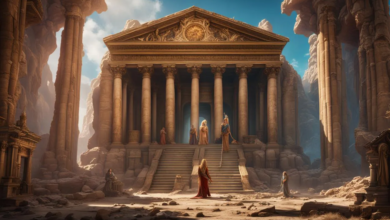The Role of Fate in Roman Mythology
Fate, or fortuna in Latin, played a significant role in the lives of the ancient Romans. In Roman mythology, fate was believed to be a force that determined the destiny of individuals and events. The concept of fate was closely tied to the belief in gods and goddesses who controlled the universe and everything in it. The Romans believed that these divine beings had the power to determine the course of mortal lives and influence the outcome of events.
One of the most prominent figures associated with fate in Roman mythology was the goddess Fortuna. Fortuna was the personification of fortune and luck, and she was worshipped by the Romans as the one who controlled the fate of individuals. According to Roman belief, Fortuna could bring either good fortune or bad fortune to those she favored or disfavored. Fortuna was often depicted as a woman holding a cornucopia, symbolizing abundance, and a wheel of fortune, symbolizing the ever-changing nature of luck.
In Roman mythology, fate was not seen as something that could be changed or altered by mortals. Instead, fate was considered to be a fixed and immutable force that determined the destiny of all beings. The Romans believed that everything that happened in the world was predestined by the gods, and that mortals had no control over their own fate.
One example of fate in Roman mythology is the story of Oedipus Rex. Oedipus was a king who unknowingly fulfilled a prophecy that he would kill his father and marry his mother. Despite his best efforts to avoid this fate, Oedipus was unable to change the course of events, as the prophecy had already been decreed by the gods. This tragic tale serves as a reminder of the power of fate in the lives of the ancient Romans.
Another example of fate in Roman mythology is the story of Aeneas, the legendary founder of Rome. Aeneas was fated to survive the fall of Troy and journey to Italy, where he would establish a new kingdom. Despite facing numerous obstacles and challenges along the way, Aeneas was able to fulfill his destiny, as it had been foretold by the gods. This story illustrates the idea that fate cannot be escaped, and that individuals must accept their predetermined destiny.
The concept of fate in Roman mythology also extended to the gods themselves. The Romans believed that even the gods were subject to the will of fate, and that they were not immune to its influence. For example, the story of Jupiter and Saturn illustrates how fate affected even the mightiest of the gods. According to Roman mythology, Jupiter overthrew his father Saturn and took his place as king of the gods, fulfilling a prophecy that had been foretold by fate.
Another important aspect of fate in Roman mythology was the concept of moira, or divine decree. Moira was the idea that each individual had a predetermined destiny that was assigned to them by the gods. This destiny was believed to be fixed and unchangeable, and individuals were expected to fulfill their destiny no matter what obstacles they may face. The Romans believed that their lives were guided by the hand of fate, and that they were powerless to alter their fate in any way.
In addition to individual fate, the Romans also believed in the concept of collective fate. According to Roman mythology, the fate of the Roman people as a whole was determined by the will of the gods. The Romans believed that their destiny as a nation was predetermined by the gods, and that they were fated to rise to power and conquer other civilizations. This belief in collective fate served as a source of unity and strength for the Roman people, as it gave them a sense of purpose and destiny.
Overall, the role of fate in Roman mythology was a central and pervasive theme that influenced the beliefs and actions of the ancient Romans. The concept of fate as a predetermined force that determined the destiny of individuals and events was deeply ingrained in Roman culture, and it shaped the way that the Romans viewed the world and their place in it. Whether it was through the worship of the goddess Fortuna, the acceptance of individual destiny, or the belief in collective fate, the idea of fate was an essential part of Roman mythology and played a significant role in shaping the beliefs and values of this ancient civilization.






